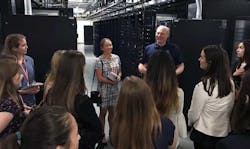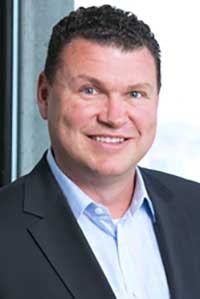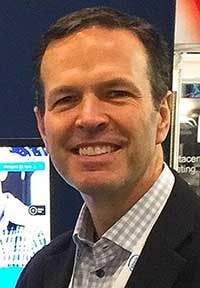Roundtable: Industry Making Progress on Diversity, But Much Work Remains
Today we conclude our Data Center Executive Roundtable, a quarterly feature showcasing the insights of thought leaders on the state of the data center industry, and where it is headed. In today’s discussion, our panel of experienced data center executives – Iron Mountain’s Michael DeVito, Chris Sharp of Digital Realty, Kristen Kroll-Moen from Chatsworth Products, Intel’s Jeff Klaus, Gary Niederpruem of Vertiv, and Amber Caramella of Netrality and Infrastructure Masons – discuss the the data center industry’s progress on diversity.
The conversation is moderated by Rich Miller, the founder and editor of Data Center Frontier.
Data Center Frontier: The data center industry is finally talking more about its diversity problem. How does this translate into real-world improvement in the representation of women in the industry? What are the concrete steps that can bring change?
AMBER CARAMELLA, Netrality Data Centers and Infrastructure Masons.
Amber Caramella: By now, it should not come as a surprise to anyone that women continue to be underrepresented in the data center industry and are still underrepresented at technology conferences and on technology panels, which is a missed opportunity for thought leadership. The issue of the gender gap is not exclusive to the data center industry and spans across a breadth of STEM fields.
At a higher level, the issue is societal; STEM fields have a significant gender gap due to gender stereotypes regarding career opportunities that develop at a young age. The notion of gender-specific occupations has a monumental impact on how our impressionable youth envisions their future career opportunities, and has driven a declined interest in technology amongst high school females. Addressing the talent gap has to start with education at high school levels.
This is a systemic, cultural issue and will take time to overcome, but we are making progress. Practically speaking, the data center industry today is proactively working towards representing our industry and workforce in a more gender-balanced way, and raising awareness for the digital infrastructure industry by creating opportunities and providing strategies and tools to bridge the gender gap. Organizations are making a conscious effort to raise visibility around diversity and inclusion by driving key initiatives to correct many of the systemic issues, such as unconscious bias in the workplace.
“This is a systemic, cultural issue and will take time to overcome, but we are making progress. … The data center industry today is working towards representing our industry and workforce in a more gender-balanced way.”
Amber Caramella, Infrastructure Masons
For example, some companies are improving efforts with recruiting and hiring practices, correcting bias job descriptions, and training recruiters to have a balanced approach when presenting applicants. Retainment is also a key initiative for organizations. Female retention in the data center industry has been a challenge due to the lack of career advancement. Organizations are building mentoring and training programs to create career paths for women to enable career advancement.
Additionally, companies can partner with organizations such as Infrastructure Masons, which aim to increase the number of under-representative groups working in the digital infrastructure industry globally and to increase the visibility and career advancement of women currently working in technical infrastructure and data centers.
Diverse teams foster creativity and offer a range of perspectives and ideas that have proven to perform better. We can’t change the world overnight but we can begin to make progress if we’re mindful and proactive about the issue.
KRISTEN KROLL-MOEN, Chatsworth Products
Kristen Kroll-Moen: Change starts early. Teachers and counselors can have a huge impact on helping motivate and inspire today’s generation to pursue more STEM, computer science and engineering programs. And although some technology programs are starting to build their own curricula, data center roles have not been as well-defined as other STEM areas of focus in most schools, colleges and universities, so it will take some time before this career path gains more attention.
But technology industry leaders have an equally important role to play as well. That means motivating our own organizations and people to consider and explore varied skills sets in recruiting to balance and grow the workforce, with more access and exposure to on-the-job training, knowledge transfer, mentoring and cross-functional support. We all have such a critical stake in recruiting to create greater diversity, innovation and leadership.
“We all have such a critical stake in recruiting to create greater diversity, innovation and leadership.”
Kristen Kroll-Moen, Chatsworth Products
As a marketer specifically, I’m passionate about the need to promote and create more awareness for not just those in our collective industries, but the general consumer who might not yet realize the impact and opportunities that data centers afford us now and will for many, many years to come.
GARY NIEDERPRUEM, Vertiv
Gary Niederpruem: Increasing diversity within our industry isn’t just the right thing to do, it’s the smart thing to do. When we can cultivate a diversity of thinking by bringing together people from different backgrounds, genders and races we become more creative and raise the level of talent within our organizations.
At Vertiv, we are always striving to increase our level of diversity through programs such as WAVE (Women at Vertiv Excel) that empower women, advocate for and enable diversity and encourage open dialog across our organization. We are also excited to support the work being done by Infrastructure Masons in helping promote awareness of the importance of gender diversity, ensuring required training is available and recognizing the outstanding women working in the industry today.
CHRIS SHARP, CTO, Digital Realty
Chris Sharp: Talking is one thing, but we need action over words when it comes to creating a diverse workforce. As an industry, we need to ensure that women are being represented across all levels, have access to meaningful training and development opportunities, and are being heard. To do that, we need to focus on not only our recruiting efforts, but also on ensuring that women are being hired and trained in an inclusive environment.
Some of the ways we’re working to achieve our diversity goals are by ensuring we have women across the company at all levels as well as on our board. Earlier this year we welcomed retired Lt. Gen. VeraLinn “Dash” Jamieson and Alexis Black Bjorlin, Ph.D. to our board of directors, two women who bring significant experience directly relevant to our strategy of enabling customers’ digital transformation.
Additionally, a few years ago Suzie Gleeson, Digital Realty’s VP of Global Accounts Sales, co-founded the Women’s Leadership Forum at Digital Realty. The community provides collaboration and support in a collegial environment for women at the company. Suzie’s efforts go beyond Digital Realty as she also co-founded the Women’s Tech Forum (WTF), an open environment for women in the data center industry to come together and build relationships. Starting in March, in honor of International Women’s Day, the WTF will publish a monthly spotlight of a Digital Realty woman, showcasing the work she is doing to power digital ambitions and the ways in which she is driving innovation in the industry.
We’ve still got a long way to go as an industry, but it’s important that we keep taking the right steps to ensure women are being well represented, and for us, that means being sure they have many seats at the table.
MICHAEL DeVITO, Iron Mountain
Michael DeVito: Diversity in any environment is a good thing. For a long time, the data center industry hasn’t addressed diversity as well as it should have. Traditionally, our industry has been very male dominated. With a global skills shortage that continues to impact tech industries today, it’s more important than ever to bridge the talent gap and arm women with the skills to succeed in the data center industry.
It’s encouraging to see more women in leadership, and there are many efforts underway that are supportive of diversity. Groups like Infrastructure Masons are helping to support these types of programs. But we need to do more, investing in STEM education and programs that encourage young women to enter the technology industry.
These matters affect not only women, but the industry as a whole. If we can be successful in cultivating a talented, diverse workforce, we will benefit from a wider range of voices which will only make our industry stronger.
JEFF KLAUS, Intel
Jeff Klaus: I agree there are many programs to help attract girls to coding and encourage women into tech. As a father of a teenage daughter, I see significant focus on STEM and coding. It’s a great introduction but I’d also like to see more women leaders speaking to younger-aged school girls, showing them the unlimited career options since tech permeates multiple industries.
NEXT: Our Roundtable Recap and links to transcripts.
Keep pace with the fact-moving world of data centers and cloud computing by following us on Twitter and Facebook, connecting with me on LinkedIn, and signing up for our weekly newspaper using the form below:
About the Author





